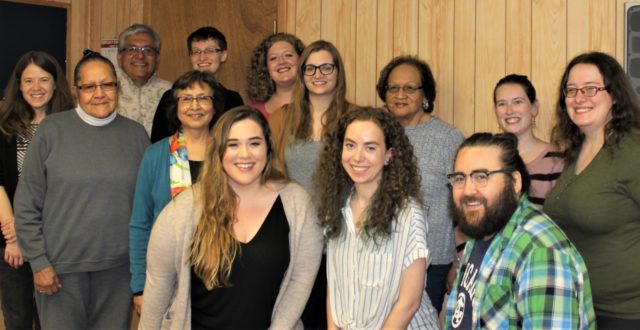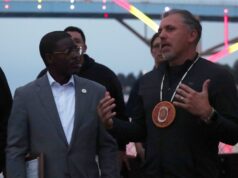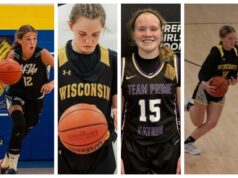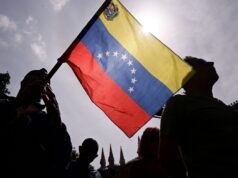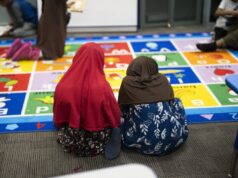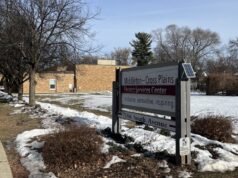
The Ho-Chunk Nation Language Division along with the participants from the UW-Madison Tribal Libraries Archives and Museums (TLAM) class hosted a thank you luncheon on May 9 at the Language Division Office in Mauston.
Their unique partnership celebrates its third year of work on the Ho-Chunk Nation Digital Library project that helps the Nation curate and use its language resources while providing the UW students with a service learning project involving an actual working collection of materials.
The success of this project is primarily due to Omar Poler, instructor of the TLAM class at UW-Madison; Janice Rice, retired UW librarian and member of the Ho-Chunk Nation; and the students from the last three spring semesters’ TLAM classes. George Greendeer, who has previous genealogy work experience with the Nation’s Enrollment Division and co-authored People of the Big Voice: Photographs of Ho-Chunk Families by Charles Van Schaick, 1879-1942, was hired back in December as the Project Specialist.
TLAM is an effort at UW-Madison to bring indigenous information to library and information science education through coursework, service-learning, continuing education, community-building, networking, resource sharing, and long term partnerships with Native American cultural institutions. The TLAM course runs every spring.
This spring, the TLAM class worked in groups on the Ho-Chunk Nation Digital Library project. Kristen Maples, Amy Sampson, and Alicia Eldridge worked with the Ho-Chunk elders. The elders provided translation and background information on audio and video recording for the students to include in the catalog. These elders were Maxine Kolner, Andy Thundercloud, Georgia Lonetree, Elliott Garvin, Hope Smith, and Richard Mann.
Elders who are recorded on the audio or video reviewed to date are Kenneth Funmaker, Sr., Edward Lonetree, Jr., Corina Lonetree, Sidney Hall, Ardella Quackenbush, Bill O’Brien, Merlin Redcloud, Gordon Thunder, Annabelle Lowe, Maxine Kolner, Lila Blackdeer, Wayne Falcon, Rebecca Greendeer, Tom Hopinkah, Myron Lowe, Eugene Cloud, George Stacy, Cecil Garvin, Larry Garvin, Richard Mann, Dennis Funmaker, Sr., Chloris Lowe, Velma Lewis, Arvid WhiteEagle, Carlos Funmaker, and John Greengrass.
UW-Madison students Alianna Bozhardt, Alicia Eldridge, and Kristen Whitson worked on policy. The policy included Deed of Gift form, Donor Guide, and applicable copyright and intellectual property law.
Justin Cornille, Samantha Wolfe, and Sarah Drake worked on cataloging. Kristen Whitson and Sarah Drake worked on scanning. Dani Fulwilder worked on archival.
The Digital Library project began three years ago with planning on what needed to be done to catalog, digitize, and archive the Language Division’s audio, video, and written documents. The initial steps were sorting and organizing material. Then converting all the Nation’s audio and video recordings and scanning the hard copy written documents into digital files.
Each item is meticulously cataloged using 36 fields of keywords and descriptor details, which are being filled in as the group of students and Nation staff make their way through each item.
Items are then uploaded to the Mukurto (MOO-koo-too) management system after the cataloging process has been completed. This management system is where users will be able to search online and see items that are in the Language Division’s collection. The total number of files in the catalog exceeds 1,000, and that number will be more significant when the site goes live.
“Users will be able to create an account, and then the users will be grouped into what are called communities. They’ll be levels of access. Depending on the type of material and subject matter, we can group people by user class group and then assign them the kind of access that we want them to have,” said Division Manager Adrienne Thunder.
“We can even change the setting so that only students and mentors from the Language Apprentice Program can access these materials or only employees of the Language Division. There is no limit to the number of layers we can create,” said linguistics student Andrea Cudworth.
Thunder says tribal members will have specific access that the general public wouldn’t have. Eventually, this will all go through the Language and Culture committee to determine the accessibility of the items.
The Nation benefits from having language resources made more accessible, better accounting of materials, and preservation of the original materials. Some language resources include audio and video capturing the spoken Ho-Chunk language, children’s books in the Ho-Chunk language, photos of Ho-Chunk ancestors, Ho-Chunk dictionary, photos of Ho-Chunk crafts, Ho-Chunk language lessons, and the collection keeps growing.
The project provides valuable professional and learning experiences for UW-Madison students.
“All of us are library and information study students that means we are studying to become librarians and archivists. I have to tell you that for me, I am in archives to do exactly what we got to do here. This has been a very fulfilling experience,” expressed UW-Madison Graduate Student Kristen Whitson.
Project Specialist George Greendeer said, “They (students) cataloged 500 items, documents. We were only expecting 300 for the semester because they had a lot of other stuff to do for their course study.”
The luncheon celebrating this work started with Division Manager Adrienne Thunder speaking and elder Maxine Kolner saying a prayer over the food. Janice Rice and Andrea Cudworth were each presented with a certificate of appreciation and a blanket for their efforts on the project.
The UW-Madison students prepared the food shared with Language Division staff and honored guests at the luncheon. The students who worked with the elders presented the elders and George Greendeer with homemade mini loaves of breads.
Staff at the Language Division office were also gifted with an Instant Pot by the UW-Madison students.
Kelly Jo Funmaker attended, representing the Office of the President, and extended gratitude to the individuals who assisted in the project.
“I know that this one of the President’s top priority, not even for the Ho-Chunk Nation but himself also. I know that he would be very proud and very happy with what is going on today,” said Funmaker.
“The fact that they’ve (UW-Madison students over the past three years) not only categorized all of the material, digitized all of the material, and now we are to the point where we are starting to populate the site that’s going to developed for real use,” explains Thunder.
Some of the UW-Madison students have volunteered to return in the summer and continue their work.
Thunder says this work, as much as has been done, is only the beginning. “In the future, the Division hopes to add to the collection with contributions of materials collected by other libraries and museums, tribal and public personal collections, and the Division’s own continuing language revitalization work.”
The Nation’s Mukurtu database will house a vast collection of resources to aid us in the coming years as our Hoocak-first speaker availability declines and our new learners are adding to their knowledge and increasing their use of our language.

